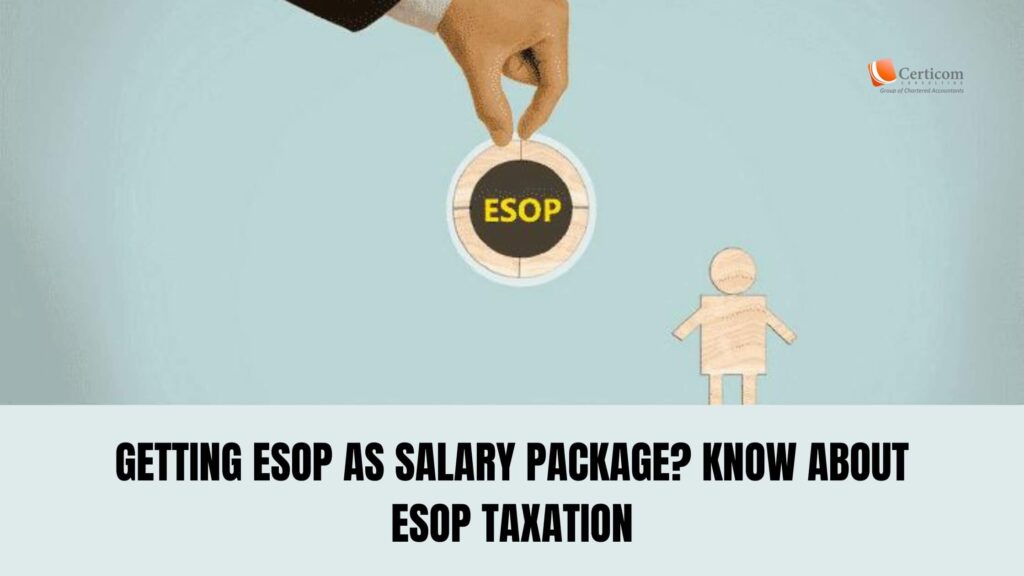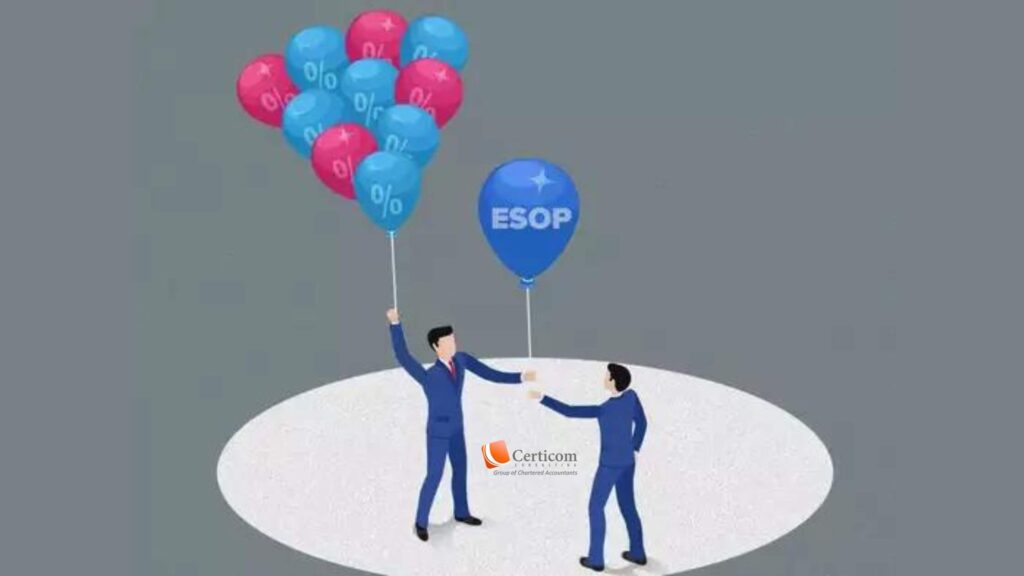Getting ESOP as salary package? Know about ESOP Taxation

ESOPs and RSUs have become common in India with start jobs gaining popularity. Several international companies with employees in India also offer ESOPs.
ESOP (Employee stock option plan) is an employee benefit plan offering employees an ownership interest in the organization. It is similar to a profit-sharing plan. Under these plans, the company, which is an employer, offers its stocks at negligible or low prices. These stocks remain in an ESOP trust fund till the vesting period and exercise these options or retire/leave the company.
Let’s understand how ESOPs are taxed.

How do ESOPs work?
Before you understand the taxation of ESOPs and RSUs, here are some key terms you must know:
ESOP
Employee Stock Option Plan allows an employee to own equity shares of the employer company over a certain period of time. The terms are agreed upon between the employer and employee.
Grant Date
The date of the agreement between the employer and employee to give the option to own shares (at a later date).
Vesting Date
The date the employee is entitled to buy shares after conditions agreed upon earlier are fulfilled. This date is also the agreed-on grant date.
Vesting Period
The time period between the grant date and vesting date.
Exercise Period
Once stocks have ‘vested’, the employee now has a right to buy (but not an obligation) the shares for a period of time. This period is called the exercise period.
Exercise Date
The date on which the employee exercises the option.
Exercise Price
The price at which the employee exercises the option. This price is usually lower than the prevailing FMV (fair market value) of the stock. An employer and employee agree on ESOP terms on the grant date. Once the employee has fulfilled the conditions or the relevant time period has elapsed, these employee stock options are vested. At this time the employee can exercise them or put simply – buy them. The employee is allowed some time period during which this option to buy can be exercised. Once the employee decides to buy, these stock options are allotted to him at an exercise price which is usually lower than the FMV of the stock. Of course, the employee can choose not to exercise his option. In that case, no tax is payable.

Calculating Taxes
ESOPs are taxed at 2 instances
At the time of exercise – as a prerequisite
When the employee has exercised the option, basically agreed to buy; the difference between the FMV (on exercise date) and exercise price is taxed as perquisite. The employer deducts TDS on this perquisite. This amount is shown in the employee’s Form 16 and included as part of total income from salary in the tax return.
Budget 2020 amendment
From the FY 2020-21, an employee receiving ESOPs from an eligible start-up need not pay tax in the year of exercising the option. The TDS on the ‘perquisite’ stands deferred to earlier of the following events:
- Expiry of five years from the year of allotment of ESOPs
- Date of sale of the ESOPs by the employee
- Date of termination of employment
At the time of sale by the employee – as a capital gain
The employee may choose to sell the shares once these are bought by him. If the employee sells these shares, another tax event happens. The difference between the sale price and FMV on the exercise date is taxed as capital gains. Exercise price ——-<Perquisite>——-FMV on exercise date——<capital gains>——sale price
How to calculate FMV
Advance Tax on capital gains
Advance Tax rules require that your tax dues (estimated for the whole year) must be paid in advance. Advance tax is paid in instalments. While the employer deducts TDS when you exercise your options, you may have to deposit advance tax if you have earned capital gains.
For FY 2021-22 for individuals instalments are due on 15th June, 15th September, 15th December and 15th March. By 15th March 100% of your taxes must be paid.
Non-payment or delayed payment of advance tax results in penal interest under section 234B and 234C. However, it may be hard to estimate tax on capital gains and deposit advance tax in the first few instalments if a sale took place later in the year.
Therefore when advance tax instalments are being paid, no penal interest is charged where instalment is short due to capital gains. Remaining instalment (after the sale of shares) of advance tax whenever due must include a tax on capital gains.
Other considerations involved
To properly calculate tax on the sale of ESOPs certain other aspects need to be considered as well.
Short-term or long-term gains
The rates at which your capital gains shall be taxed depends on the period of holding them. The period of holding is calculated from the exercise date up to the date of sale. Equity shares listed on a recognised stock exchange (where STT is paid on sale) are considered as long-term gains when held for more than one year. If sold within one year, they are considered as short-term gains. Currently, long-term gains on listed equity shares are taxed at 10% without indexation on LTCG above Rs 1 lakh, whereas short-term capital gains are taxed at 15%.
When you have incurred a loss
In case you have incurred a loss you are allowed to carry forward short term capital losses in your tax return and adjust & set them off against gains in future years.

Other considerations involved
Listed or unlisted shares
The Income Tax Act differentiates between tax treatment of listed and unlisted shares. The tax treatment for shares that are unlisted in India or listed out of India remains the same. That is, if you own shares of an American company, they will not be listed in India.
They may be considered unlisted for the purpose of taxes in India. The shares are short-term when held for less than 3 years and long-term when sold after 3 years. Starting FY 2016-17, UNLISTED equity shares shall be short term capital assets – when sold within 24 months of holding them and long term capital assets – when sold after 24 months of holding them [Applicable for sales made on or after 1st April 2016].
The period of holding begins from the exercise date up to the date of sale. In this case, short-term gains are taxed at income-tax slab rates and long-term gains are taxed at 20% after indexation of cost.
Residential status
Your income is taxable in India according to your residential status. If you are a resident, all your income from anywhere in the world are taxed in India. On the other hand, if you are a non-resident or resident but not ordinarily resident and have exercised your options or sold your shares, you may have to pay tax outside of India. In such a case, you may be able to take the benefit of Double Taxation Avoidance Agreement (DTAA). It makes sure your income is not taxed twice.
Disclosures
Several disclosures have been added in income tax return forms for foreign assets. If you own ESOPs or RSUs of a foreign company, you may have to disclose your foreign holdings under schedule FA of your income tax return. These disclosure requirements are applicable to a resident taxpayer.
When options are not exercised
On the vesting date the employee gains a right to exercise his option or buy the stocks. But there is no obligation, employee can choose to not exercise his option. In such a case there shall be no tax implication for the employee.

Frequently Asked Questions
If I exercise ESOPs, what do I get, a certificate for shares or something else? What other rights do I get with it?
Yes, you will get a certificate, usually in paper. ESOPs may or may not come with voting rights. If you are in a very senior position and if these ESOPs are substantial, say more than 5% of the total, there are other considerations involved. As a result, you may have voting rights or the employer company may have to make relevant disclosures.
Read More: BEST TIPS TO SAVE INCOME TAX ON SALARY IN FY 2023-24
Say I have been allocated 300 ESOPs, can I exercise them in parts?
When you are given the option to exercise your ESOPs, a time period is given within which you have to exercise them. You can spread them during that period. Does their FMV vary substantially during this period? If yes, and if you feel this would allow you to spread your cost, you can exercise in parts. Usually this strategy is adopted if shares are listed and it helps you spread your cost. Mostly, it does not make a big difference in the case of unlisted shares.
From tax perspective, is exercising in current FY better or next is also fine?
There is no change in tax rules for unlisted equity shares between FY 2016-17 & FY 2017-18.
Related Post
Loan Interest Deductions: How to Claim and Avoid Tax Scrutiny
NRI Tax Filing in India: A Guide to Rent, Capital Gains & Interest Income
Book A One To One Consultation Now For FREE
How can we help? *




